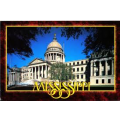As of June 1st, 2012, the state of Mississippi has more than seven hundred hospital and retail pharmacies. According to data recently released by the Bureau of Labor Statistics, Mississippi pharmacies employ roughly 3,480 full time professional pharmacy technicians. Less than half of the state's pharmacy technicians are licensed by the Mississippi Board of Pharmacy. This does not, however, indicate a lack of competence, but is more often a question of updating paperwork and hiring on-the-job trainees. Clearly, pharmacists prefer to work with licensed assistants. As a result, licensed technicians are much more marketable in the work force. In any case, pharmacy technicians all across America obtain state-approved and nationally accredited licensing, although regulations and guidelines regarding pharmacy technicians will vary from state to state.












